Deck 16: The Digestive System
Question
Question
Question
Question
Question
Question
Question
Question
Question
Question
Question
Question
Question
Question
Question
Question
Question
Question
Question
Question
Question
Question
Question
Question
Question
Question
Question
Question
Question
Question
Question
Question
Question
Question
Question
Question
Question
Question
Question
Question
Question
Question
Question
Question
Question
Question
Question
Question
Question
Question
Question
Question
Question
Question
Question

Unlock Deck
Sign up to unlock the cards in this deck!
Unlock Deck
Unlock Deck
1/55
Play
Full screen (f)
Deck 16: The Digestive System
1
What is the function of structure B? 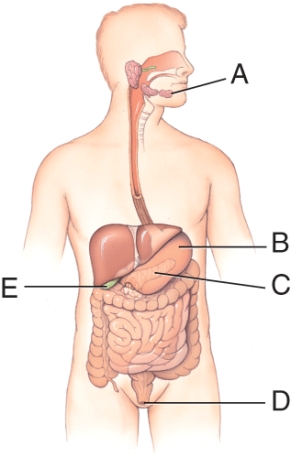
A) Begin digestion of carbohydrates
B) Begin digestion of proteins
C) Absorption of lipids
D) Absorption of proteins

A) Begin digestion of carbohydrates
B) Begin digestion of proteins
C) Absorption of lipids
D) Absorption of proteins
B
2
What is the name of the structure labeled A? 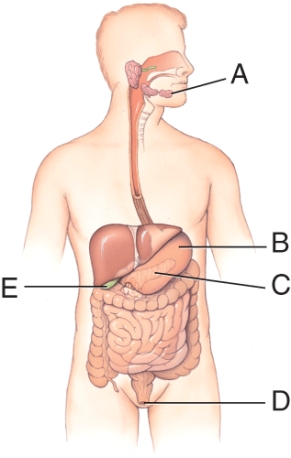
A) Salivary gland
B) Mouth
C) Pharynx
D) Tongue

A) Salivary gland
B) Mouth
C) Pharynx
D) Tongue
A
3
Where does peristalsis start during deglutition?
A) Mouth
B) Pharynx
C) Esophagus
D) Stomach
A) Mouth
B) Pharynx
C) Esophagus
D) Stomach
C
4
With what digestive organ are these structures associated? 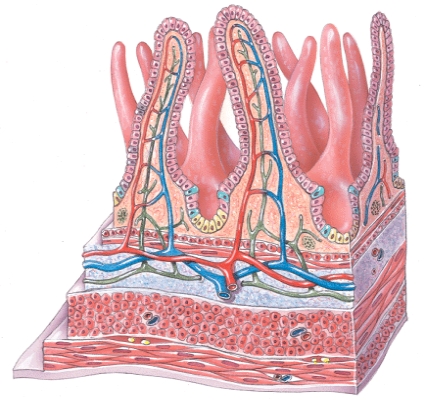
A) Tongue
B) Liver
C) Small intestine
D) Pancreas

A) Tongue
B) Liver
C) Small intestine
D) Pancreas

Unlock Deck
Unlock for access to all 55 flashcards in this deck.
Unlock Deck
k this deck
5
What is the purpose of the acidic conditions of the stomach?
A) It is necessary to absorb vitamin B12.
B) The acid digests the protein.
C) It activates pepsin and kills microbes.
D) The acid creates small holes called gastric pits, which release the digestive enzymes of the stomach.
A) It is necessary to absorb vitamin B12.
B) The acid digests the protein.
C) It activates pepsin and kills microbes.
D) The acid creates small holes called gastric pits, which release the digestive enzymes of the stomach.

Unlock Deck
Unlock for access to all 55 flashcards in this deck.
Unlock Deck
k this deck
6
Which teeth are for piercing and ripping?
A) Incisors
B) Canines
C) Premolars
D) Molars
A) Incisors
B) Canines
C) Premolars
D) Molars

Unlock Deck
Unlock for access to all 55 flashcards in this deck.
Unlock Deck
k this deck
7
Which nutrient requires the least energy expenditure to arrive in the blood stream? 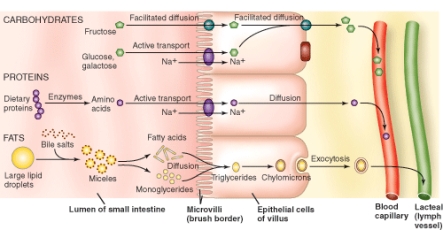
A) Fructose
B) Glucose
C) Amino acids
D) Fatty acids and monoglycerides

A) Fructose
B) Glucose
C) Amino acids
D) Fatty acids and monoglycerides

Unlock Deck
Unlock for access to all 55 flashcards in this deck.
Unlock Deck
k this deck
8
The ileum is part of which structure?
A) Large intestine
B) Stomach
C) Small intestine
D) Pancreas
A) Large intestine
B) Stomach
C) Small intestine
D) Pancreas

Unlock Deck
Unlock for access to all 55 flashcards in this deck.
Unlock Deck
k this deck
9
What is the function of salivary amylase?
A) Digest lipids
B) Digest starch
C) Digest sucrose
D) Digest protein
A) Digest lipids
B) Digest starch
C) Digest sucrose
D) Digest protein

Unlock Deck
Unlock for access to all 55 flashcards in this deck.
Unlock Deck
k this deck
10
In the illustration, which organ secretes digestive enzymes and produces hormones? 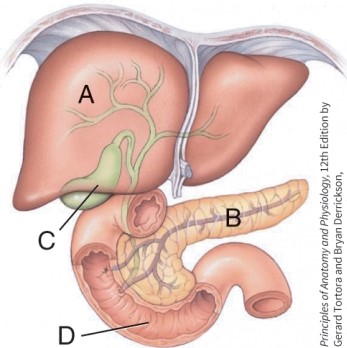
A) A
B) B
C) C
D) D

A) A
B) B
C) C
D) D

Unlock Deck
Unlock for access to all 55 flashcards in this deck.
Unlock Deck
k this deck
11
Which stage of swallowing is shown here? 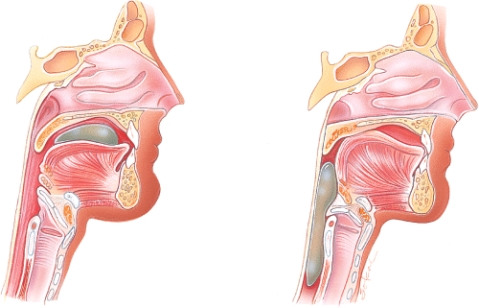
A) Voluntary stage
B) Pharyngeal stage
C) Esophageal stage
D) Pyloric stage

A) Voluntary stage
B) Pharyngeal stage
C) Esophageal stage
D) Pyloric stage

Unlock Deck
Unlock for access to all 55 flashcards in this deck.
Unlock Deck
k this deck
12
The hepatic portal system is composed of blood vessels that bring _________.
A) nutrient-rich blood to the liver for processing
B) oxygen-rich blood to the liver
C) oxygen-poor blood away from the liver
D) bile to the small intestine
A) nutrient-rich blood to the liver for processing
B) oxygen-rich blood to the liver
C) oxygen-poor blood away from the liver
D) bile to the small intestine

Unlock Deck
Unlock for access to all 55 flashcards in this deck.
Unlock Deck
k this deck
13
What is the purpose of mixing waves in the stomach?
A) Stimulation of small intestine
B) Initiation of the ejection of digestive enzymes
C) Mixing gastric juices with bolus
D) Reverse peristalsis
A) Stimulation of small intestine
B) Initiation of the ejection of digestive enzymes
C) Mixing gastric juices with bolus
D) Reverse peristalsis

Unlock Deck
Unlock for access to all 55 flashcards in this deck.
Unlock Deck
k this deck
14
Which layer of the GI tract is responsible for peristalsis?
A) Mucosa
B) Submucosa
C) Muscularis
D) Serosa
A) Mucosa
B) Submucosa
C) Muscularis
D) Serosa

Unlock Deck
Unlock for access to all 55 flashcards in this deck.
Unlock Deck
k this deck
15
What is the function of structure C? 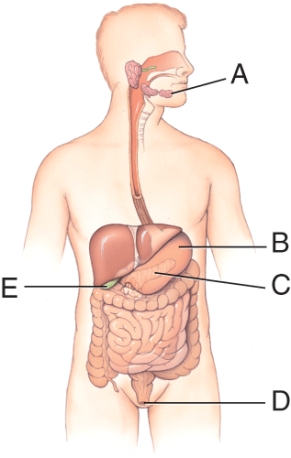
A) Absorption of lipids
B) Production of saliva
C) Production of enzymes necessary for digestion
D) Digestion and absorption of water

A) Absorption of lipids
B) Production of saliva
C) Production of enzymes necessary for digestion
D) Digestion and absorption of water

Unlock Deck
Unlock for access to all 55 flashcards in this deck.
Unlock Deck
k this deck
16
What is the name of structure D? 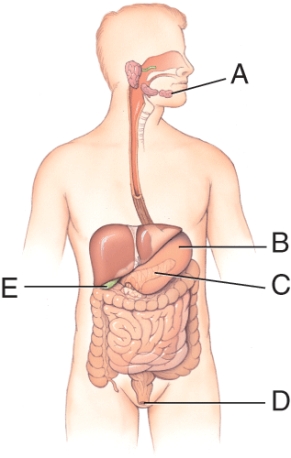
A) Appendix
B) Anus
C) Transverse colon
D) Rectum

A) Appendix
B) Anus
C) Transverse colon
D) Rectum

Unlock Deck
Unlock for access to all 55 flashcards in this deck.
Unlock Deck
k this deck
17
Which macromolecules are digested in the stomach?
A) Carbohydrates
B) Fats
C) Proteins
D) Fats and proteins
A) Carbohydrates
B) Fats
C) Proteins
D) Fats and proteins

Unlock Deck
Unlock for access to all 55 flashcards in this deck.
Unlock Deck
k this deck
18
A cavity is damage to which region of the tooth?
A) Dentin
B) Enamel
C) Pulp
D) Root
A) Dentin
B) Enamel
C) Pulp
D) Root

Unlock Deck
Unlock for access to all 55 flashcards in this deck.
Unlock Deck
k this deck
19
What is the name of the process pictured here? 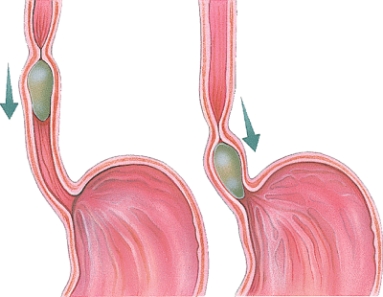
A) Digestion
B) Absorption
C) Peristalsis
D) Maceration

A) Digestion
B) Absorption
C) Peristalsis
D) Maceration

Unlock Deck
Unlock for access to all 55 flashcards in this deck.
Unlock Deck
k this deck
20
What is the function of structure C? 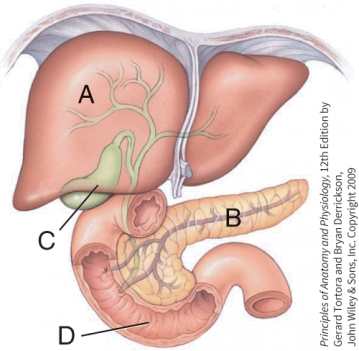
A) Production of enzymes necessary for digestion
B) Absorption of water
C) Storage of bile
D) Absorption of vitamins

A) Production of enzymes necessary for digestion
B) Absorption of water
C) Storage of bile
D) Absorption of vitamins

Unlock Deck
Unlock for access to all 55 flashcards in this deck.
Unlock Deck
k this deck
21
What is a hydrolase?
A) An enzyme that digests water.
B) A cell that makes hydrochloric acid.
C) An enzyme that digests polymers by inserting water molecules between monomers.
D) A cell that absorbs water in the colon.
A) An enzyme that digests water.
B) A cell that makes hydrochloric acid.
C) An enzyme that digests polymers by inserting water molecules between monomers.
D) A cell that absorbs water in the colon.

Unlock Deck
Unlock for access to all 55 flashcards in this deck.
Unlock Deck
k this deck
22
Some enzymes are free-floating in the fluid of the bolus and chyme, while others are located on the surface of the cells of the small intestine.

Unlock Deck
Unlock for access to all 55 flashcards in this deck.
Unlock Deck
k this deck
23
Most digestion and absorption occurs in the:
A) oral cavity.
B) esophagus.
C) stomach.
D) small intestine.
A) oral cavity.
B) esophagus.
C) stomach.
D) small intestine.

Unlock Deck
Unlock for access to all 55 flashcards in this deck.
Unlock Deck
k this deck
24
Where is pepsin produced?
A) Salivary glands
B) Stomach
C) Liver
D) Pancreas
A) Salivary glands
B) Stomach
C) Liver
D) Pancreas

Unlock Deck
Unlock for access to all 55 flashcards in this deck.
Unlock Deck
k this deck
25
Which nutrient must be converted into a chylomicron prior to being absorbed?
A) Triglycerides
B) Glucose
C) Starch
D) Amino acids
A) Triglycerides
B) Glucose
C) Starch
D) Amino acids

Unlock Deck
Unlock for access to all 55 flashcards in this deck.
Unlock Deck
k this deck
26
The stomach is involved only in chemical digestion.

Unlock Deck
Unlock for access to all 55 flashcards in this deck.
Unlock Deck
k this deck
27
What is the substrate for trypsin?
A) Starch
B) Proteins
C) Triglycerides
D) Lipids
A) Starch
B) Proteins
C) Triglycerides
D) Lipids

Unlock Deck
Unlock for access to all 55 flashcards in this deck.
Unlock Deck
k this deck
28
What kind of enzyme is shown in this picture? 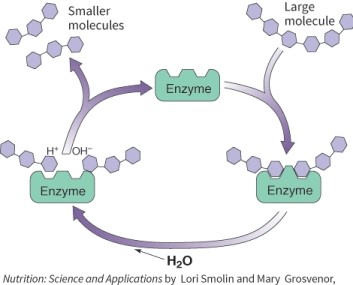
A) Hepatocyte
B) Synthatase
C) Hydrolase
D) Synthase

A) Hepatocyte
B) Synthatase
C) Hydrolase
D) Synthase

Unlock Deck
Unlock for access to all 55 flashcards in this deck.
Unlock Deck
k this deck
29
Once food passes the lower esophageal sphincter, it cannot reverse and flow backwards.

Unlock Deck
Unlock for access to all 55 flashcards in this deck.
Unlock Deck
k this deck
30
The function of Peyers patches is the:
A) production of digestive enzymes.
B) protection from pathogens.
C) absorption of fats.
D) production of hormones.
A) production of digestive enzymes.
B) protection from pathogens.
C) absorption of fats.
D) production of hormones.

Unlock Deck
Unlock for access to all 55 flashcards in this deck.
Unlock Deck
k this deck
31
Cows feed on grass which humans can't digest and therefore expand the food supply.

Unlock Deck
Unlock for access to all 55 flashcards in this deck.
Unlock Deck
k this deck
32
The tonsils and MALT are both immune structures associated with the digestive system.

Unlock Deck
Unlock for access to all 55 flashcards in this deck.
Unlock Deck
k this deck
33
Mesenteries are folds in the abdominal lining that help to secure the digestive organs.

Unlock Deck
Unlock for access to all 55 flashcards in this deck.
Unlock Deck
k this deck
34
The portion of the large intestine just before the rectum is the:
A) sigmoid colon.
B) anus.
C) cecum.
D) appendix.
A) sigmoid colon.
B) anus.
C) cecum.
D) appendix.

Unlock Deck
Unlock for access to all 55 flashcards in this deck.
Unlock Deck
k this deck
35
Chemical digestion of carbohydrates takes place:
A) in the mouth.
B) in the stomach.
C) in the small intestine.
D) in the mouth and small intestine.
A) in the mouth.
B) in the stomach.
C) in the small intestine.
D) in the mouth and small intestine.

Unlock Deck
Unlock for access to all 55 flashcards in this deck.
Unlock Deck
k this deck
36
The intestinal phase of gastric digestion begins when chyme starts to leave the stomach through the pyloric sphincter.

Unlock Deck
Unlock for access to all 55 flashcards in this deck.
Unlock Deck
k this deck
37
In the diagram, the arrow is pointing at the: 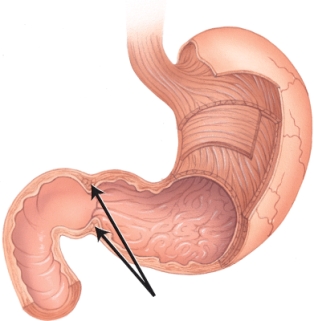
A) rugae sphincter.
B) duodenal sphincter.
C) esophageal sphincter.
D) pyloric sphincter.

A) rugae sphincter.
B) duodenal sphincter.
C) esophageal sphincter.
D) pyloric sphincter.

Unlock Deck
Unlock for access to all 55 flashcards in this deck.
Unlock Deck
k this deck
38
If we don't eat, we can break down glycogen and convert fats and proteins into glucose to maintain blood sugar levels.

Unlock Deck
Unlock for access to all 55 flashcards in this deck.
Unlock Deck
k this deck
39
During phase B the release of which hormone increases? 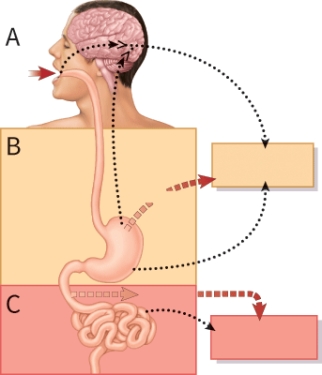
A) CCK
B) Secretin
C) Gastrin
D) Pepsin

A) CCK
B) Secretin
C) Gastrin
D) Pepsin

Unlock Deck
Unlock for access to all 55 flashcards in this deck.
Unlock Deck
k this deck
40
Chewing is an example of:
A) mechanical digestion.
B) chemical digestion.
C) enzymatic digestion.
D) peristalsis.
A) mechanical digestion.
B) chemical digestion.
C) enzymatic digestion.
D) peristalsis.

Unlock Deck
Unlock for access to all 55 flashcards in this deck.
Unlock Deck
k this deck
41
The digestive system's job is to prepare nutrients to circulate through the ______________.

Unlock Deck
Unlock for access to all 55 flashcards in this deck.
Unlock Deck
k this deck
42
The first part of the small intestine is called the ______________.

Unlock Deck
Unlock for access to all 55 flashcards in this deck.
Unlock Deck
k this deck
43
___________ results from chyme moving too quickly in the colon for water to be absorbed adequately.

Unlock Deck
Unlock for access to all 55 flashcards in this deck.
Unlock Deck
k this deck
44
The phase of digestion that is initiated when you think about and/or smell a delicious food is called the ______________ phase.

Unlock Deck
Unlock for access to all 55 flashcards in this deck.
Unlock Deck
k this deck
45
The names of enzymes, usually include the name of the substrate and the suffix _______.

Unlock Deck
Unlock for access to all 55 flashcards in this deck.
Unlock Deck
k this deck
46
All digestive enzymes except for two, act in the small intestine.

Unlock Deck
Unlock for access to all 55 flashcards in this deck.
Unlock Deck
k this deck
47
All digestive enzymes work best at pH 7.

Unlock Deck
Unlock for access to all 55 flashcards in this deck.
Unlock Deck
k this deck
48
Mechanical digestion alters chemical bonds.

Unlock Deck
Unlock for access to all 55 flashcards in this deck.
Unlock Deck
k this deck
49
What are the five basic processes of the digestive system?

Unlock Deck
Unlock for access to all 55 flashcards in this deck.
Unlock Deck
k this deck
50
E. coli is not normally found in the digestive system; it is only found when a person has acquired food poisoning from eating tainted food.

Unlock Deck
Unlock for access to all 55 flashcards in this deck.
Unlock Deck
k this deck
51
What happens when blood glucose levels drop?

Unlock Deck
Unlock for access to all 55 flashcards in this deck.
Unlock Deck
k this deck
52
The tongue moves the chewed food around the mouth and mixes it with saliva to form a _________, which is then swallowed.

Unlock Deck
Unlock for access to all 55 flashcards in this deck.
Unlock Deck
k this deck
53
The small folds on the inner wall of the small intestine that contain lacteals are called ________.

Unlock Deck
Unlock for access to all 55 flashcards in this deck.
Unlock Deck
k this deck
54
What is the function of the large intestine?

Unlock Deck
Unlock for access to all 55 flashcards in this deck.
Unlock Deck
k this deck
55
The voluntary expulsion of feces from the anus is known as ______________.

Unlock Deck
Unlock for access to all 55 flashcards in this deck.
Unlock Deck
k this deck


